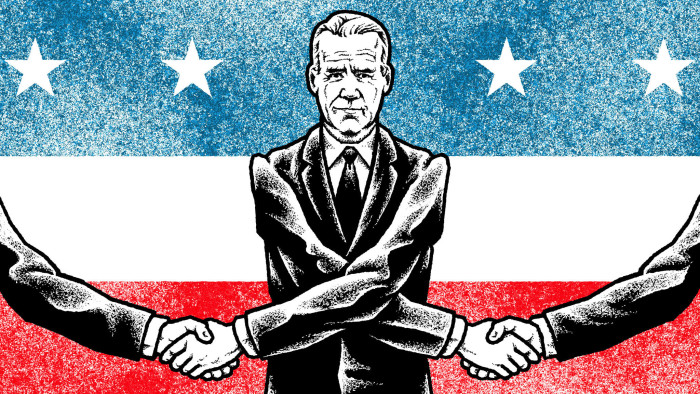In praise of the decency of Joe Biden, US vice-president


Roula Khalaf, Editor of the FT, selects her favourite stories in this weekly newsletter.
American politicians have rarely been held in lower esteem. In some cases, it is well earned. But for Joe Biden, who buried his son, Beau, in Delaware on Saturday, a better measure should apply. Almost alone among senior Washington figures, the US vice-president is liked — and trusted — on all sides. In an era where faith in politicians has vanished, Mr Biden deserves a far better rating. At 72, and with barely 18 months left in office, many see him as a holdover from an age when senators sealed deals with a handshake. But if US politics is to regain its lost pragmatism, his way of business must come back into fashion.
To be sure, Mr Biden is also the politician comedians most love to mock. The term “Bidenism” — self-inflicted public humiliation — has entered everyday use. “Stand up Chuck, let ’em see ya,” Mr Biden once said to a Missouri senator, who was in a wheelchair. “Folks, I can tell you, I’ve known eight presidents, three of them intimately,” he said in praise of Barack Obama. “I promise you, the president has a big stick, I promise you,” he insisted in a mangled rendition of Theodore Roosevelt’s dictum about speaking softly and carrying a big stick. With Mr Biden, the risk of a gaffe is ever-present, which is why Mr Obama’s campaign quarantined him in 2012.
Yet Mr Biden is also the man to whom Mr Obama turns for a deal. The US president makes no secret of his disdain for backroom politics. Mr Biden lives for it. In 2009, Mr Biden convinced three Republican senators to vote for Mr Obama’s $787bn stimulus, which helped save the US economy from depression. It passed by one vote. Without it Mr Obama would have stood little chance of re-election. Mr Biden also struck the deal that averted the US from going over the “fiscal cliff” in 2013. That, too, would have killed growth.
In an age where politicians live in front of the camera, Mr Biden is at heart a salesman.
“Joe can walk into any room, however divided, and find the common ground,” said Ted Kaufman, who was his chief of staff and Senate successor. “Who else can you say that about nowadays?”
Not many, is the answer. Two decades ago Mr Biden convinced Strom Thurmond, his Republican counterpart on the Senate judiciary committee, to vote for a landmark 1994 anti-crime bill. It put 100,000 more police on the beat and imposed a ban on assault weapons. An ageing segregationist, Mr Thurmond was the epitome of the deep south’s hatred of federal meddling. Tackling the crime epidemic was the most divisive issue of the day. Mr Biden’s feat is the equivalent of persuading Tea Party conservatives today to back an immigrant amnesty.
Mr Biden also talked Jesse Helms, the North Carolina Republican, into restoring US funding for the UN. No two Republicans were more averse to Mr Biden’s world view. Yet he delivered eulogies at their funerals.
Much of the vanished trust in US politicians stems from the public’s belief that they run for office to enrich themselves. Here Mr Biden also stands out. He is relatively poor, with a net worth of $419,000 by one estimate. Hillary Clinton (whose wealth is thought to be in the tens of millions, though precise figures are elusive) and John Kerry (with close to $200m) are in another league.
No matter how fortunate, most politicians take pains to convince voters they come from blue collar origins. Even where the “log cabin” touches aren’t invented, successful ones leave it behind.
In Mr Biden’s case it is still true. His wife, Jill Biden, teaches full time at a community college in Virginia. So, too, is Mr Biden’s family story. He was elected in 1972 to the US Senate from Delaware. Shortly after, his first wife and one of his children were killed in a car accident. The two surviving children, one of whom, Beau, died last month from brain cancer at 46, suffered injuries. Every day for the next 36 years, “Amtrak Joe” took the train from Wilmington to Washington and back — a total of three hours daily commute.
Mr Biden also has detractors. In a plot that was never attempted, Osama bin Laden instructed an al-Qaeda team to spare Mr Biden and kill Mr Obama.
“Biden is totally unprepared for the job [the presidency] and that will lead the US into crisis,” bin Laden told his acolytes.
Last year, Robert Gates, the former US defence secretary, said Mr Biden had “been wrong on every national security issue of the last 40 years”. The vice-president advised Mr Obama not to risk the raid on bin Laden, for example. He also voted for the 2003 Iraq invasion.
Yet Mr Gates was being unfair. Like any politician, Mr Biden has won some and lost some. He first ran for Congress on a platform opposing the disastrous war in Vietnam.
He warned Mr Obama that the 2011 overthrow of Libya’s Muammer Gaddafi would result in chaos. He was also rightly sceptical of putting more US troops in Afghanistan.
Might he try again for the White House? Probably not — and if he did he would probably lose to Mrs Clinton. Perhaps that is as it should be.
Yet his candidacy would also enrich the tone of the 2016 race. Whatever else can be said of Mr Biden, his approach to politics is one the US cannot afford to lose.
. . .
Letters in response to this column:
As a senator, Biden was a true local politician / From Harvey Clark Greisman
If all politicians were as decent as Biden . . . / From Eva C Jedruch
Comments